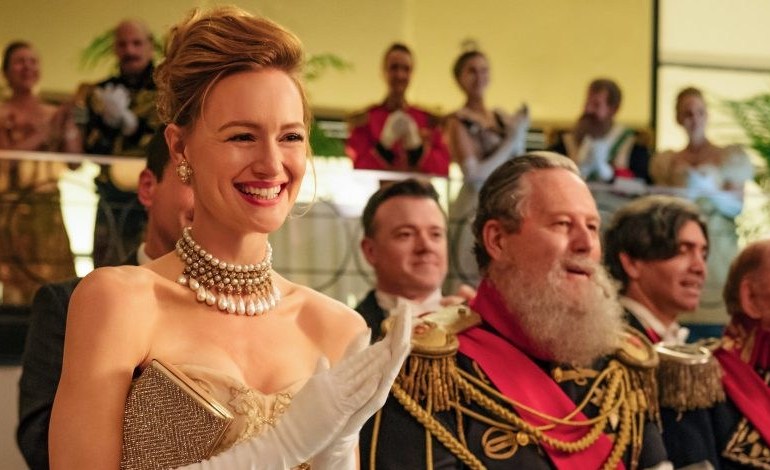The Romanoffs, Mad Men creator Matthew Weiner’s new series on Amazon’s Prime Video, is a series about those believing they are descendants of the Russian Romanov family executed a century ago. Each episode is a separate story in the tale of those possible or fake descendants, snapshots of their lives at times of great change.
“The Violet Hour” opens The Romanoffs with Greg (Aaron Eckhart) and his girlfriend Sophie (Louise Bourgoin) waiting for Anushka (Marthe Keller), Greg’s aunt, to die. They want her extravagant apartment, and her fainting spells are like dangling a carrot in front of them. Sophie is more obvious about her greed while Greg tries to do so with kindness, helping cycle through new housekeepers with Anushka’s demands and casual cruel destruction while occasionally having dinner with her. In comes Hajar (Inès Melab), the new caretaker who is a young Muslim woman. This does not sit well with Anushka, whose unchecked racism and snide remarks plague Hajar as she simply tries to do her job.
It’s hard to care much for Anushka at first, with her sneering gazes any time Hajar enters the room or her treatment of those around her, abusive and uncaring. She uses history as a weapon, tossing it in Hajar’s face as she cleans around the Faberge egg and shows the various rooms of her extraordinary Paris apartment, each room a signifier of her life and emotional wounds. The only one safe from her is the dog, Alexei. But Hajar is able to see through it all, able to pinpoint to Greg in a quieter moment that it is simply loneliness that haunts his aunt.
Keller does a wonderful job, striking the old racism and higher-than-you-class tone with the power of a gong. She elevates a scene by simply holding a cigarette or ringing her servant’s bell. But it’s in Melab’s Hajar where “The Violet Hour” finds its soul. Her quiet acceptance of the vile things thrown at her in the earlier moments and her devoted stoicism as she becomes part of Anushka’s life are where the episode really shines.
The nearly 90 minute episode speeds through its ending after a long wind-up getting there. It can feel like most of its characters are privileged opportunists with little redemption; but beyond that, it’s a look at entitlement and companionship, race as a form of social class, and where Paris is as a city. It doesn’t always work, but it takes enough care in its characters and what it’s trying to say that the episode delivers.
The second episode, “The Royal We”, opens with Michael (Corey Stoll) and Shelly (Kerry Bishé) in a counseling session. Michael is vague and despondent, almost bored with simply existing, while Shelly is open and forthright, really trying to get to the bottom of the issues at hand. Jury duty and a trip threaten to coincide, but rather than try and botch the selection, Michael gets in all because of a male gaze-ridden interest in a fellow juror (Janet Montgomery). Shelly, however, takes a Romanov-themed cruise trip by herself. She, too, is tempted by a newcomer to her life, a fellow cruise attendee played by Noah Wyle.
“The Royal We” is a far better episode, with Bishé proving again (as she had in AMC’s Halt and Catch Fire) she can light up any scene she’s in. Stoll and Montgomery’s side of the story, while entertaining, has a strange tone to it, especially with the lingering camera on any shot of Montgomery. Its focus on what makes Michael and Shelly happy, and how each come to that decision in separate ways over the course of a weekend. It takes a flailing marriage and crushing reality to snap the focus for these characters, and Bishé and Stoll nail their portrayals while doing so. It’s a tighter focus than the previous episode, and really drives to the point of these two as their marriage hits a rock that could have easily been avoided.
As an opening to the eight episodes, these two are a solid, but a little uneven, start. “The Royal We” is a vastly better told and wisely edited tale, but both suffer under their running time. 90 minute episodes can prove to be too long, working well in one case but not in the opening episode. As a follow-up to Mad Men, Weiner has created a show built around identity and trying to attain something more than what you have, and in both episodes, finding out more about yourself in the process. It’s gorgeously shot and beautiful but suffers under its own length. It’s a good start, but leaves a little to be desired after seeing the capabilities of Mad Men’s storytelling. But if The Romanoffs does more episodes like “The Royal We”, it is going to be a very fun ride.


